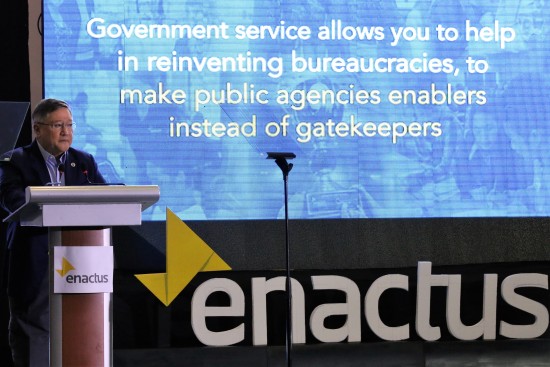Finance Secretary Carlos Dominguez III has called on socially responsible young Filipinos to pay forward the opportunities given to them by joining the government service, where they can become “enablers of meaningful change” and play a key role in revolutionizing the country’s institutions of governance.
Dominguez said that governance under the new economy driven by constant innovation needs this young generation of Filipinos to enrich public service and help Government adapt to change.
“Governance in the new economy demands a completely new set of attitudes. Instead of standardizing everything, governance must be more sensitive to differentiation and peculiarity. Instead of gatekeeping, our public agencies must be more responsive to innovation ,” said Dominguez at the awarding ceremonies of the Enactus Philippines National Finals held over the weekend at the SMX Mall of Asia.
Dominguez said, ” It is not private enterprise that should adjust to bureaucratic control but the bureaucracy that must adjust to the changing terrain of enterprise .”
“You, the next generation of Filipinos, get it. You are completely at ease with the new set of attitudes. It is, after all your set of attitudes: a profound tolerance for differentiation and a discomfort for uniformity, an eagerness to innovate with a healthy impatience for the inefficient , ” he said.
The competition organized by Enactus Philippines, a non-profit organization, recognizes notable entrepreneurial projects and community service initiatives of Filipino students to inspire the youth to become socially responsible business leaders.
Enactus has established a presence in 36 countries and involves over 1,600 colleges and universities across the globe.
“Nothing could be more meaningful for our students than to engage their communities and bring about real changes to improve lives. This is far better and more productive than rabble-rousing in the streets over abstract concepts,” Dominguez said in recognizing the efforts of the participants in the competition.
“By participating in this program, all of you here have decided to pay forward. You have made the decision to be a participant in bringing meaningful change to our communities. I can only commend you for making that decision,” Dominguez said. “I will leave you with a challenge, however. I challenge you to bring your talents and your training to the public service.”
He said that while working in the government is not the most lucrative career option available to fresh graduates, it is, however, a satisfying choice to take especially for those “who wish to serve their country well , ” as it provides them with the opportunity to help public agencies become “enablers” rather than mere “gatekeepers” and contribute to national efforts to improve the lives of their fellow Filipinos.
“It will be to the good of our country for a fresh new generation to come and help revolutionize our institutions of governance. The public service can no longer be the last line of defense of the old order. It must be the cutting edge of an innovative nation, one constantly willing to try out new ways of doing things,” Dominguez said.
He said this is why he prefers to surround himself with young people, pointing out, for instance, that his support staff at the Department of Finance (DOF) consists of “highly energetic, dynamic, dedicated and smart” achievers whose average age is below 25.
In his speech, Dominguez invited participants in the Enactus finals to join the DOF’s internship program, where they can hone their skills in various fields such as policy, research, fiscal management and development.
The DOF internship program, which is open to students of finance and economics, currently has around 32 interns working in the Department’s different offices, including the International Finance Group and the Strategy, Economics and Results Group.
Dominguez commended Enactus Philippines for encouraging the youth to make a difference in their communities by undertaking projects that help bring about “real change” and improve lives.
“Enactus introduced a powerful model for bringing students to their communities in a manner that involves the application of acquired skills. This is a model with great impact on social development and a lasting effect on the lives of the poor,” Dominguez noted.
He said, “Working on feasible projects tests our skills in solving problems. They make the skills acquired in the classrooms immensely more relevant, and definitely they close the gap between the ivory tower and the real world.”
“I hope this approach to building a synergy between classroom learning and serving the poor will be replicated and improved. This is a force for so much good,” he said.





